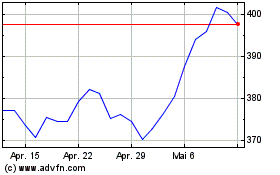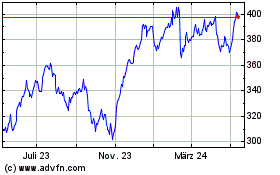SoftBank Dumps Moody's Over Rating -- WSJ
26 März 2020 - 8:02AM
Dow Jones News
By Phred Dvorak
This article is being republished as part of our daily
reproduction of WSJ.com articles that also appeared in the U.S.
print edition of The Wall Street Journal (March 26, 2020).
SoftBank Group Corp. dropped Moody's Investors Service after the
credit-ratings firm criticized the Japanese tech giant's massive
share-and-debt buyback plan and downgraded its ratings by two
notches.
Moody's questioned the "unexpected size and apparent urgency" of
SoftBank's plan, which proposes up to $41 billion in asset sales to
fund repurchases of stocks and bonds.
SoftBank said Wednesday that there was no rationale for such a
large downgrade and that the action "will cause substantial
misunderstanding among investors."
SoftBank's rating was already considered noninvestment grade, or
junk, before Wednesday's downgrade. Moody's cut, to Ba3 from Ba1,
won't force any bond redemptions or affect its loans, a SoftBank
spokesperson said.
The tit-for-tat highlights the conflict of interest underlying
credit ratings, since companies pay to be rated and can dump rating
firms that don't give them scores they like. It also suggests how
high the stakes are for SoftBank, which is pulling out the stops to
raise its share price, which had halved since February, and bolster
its balance sheet, weighed down by $70 billion in stand-alone
debt.
SoftBank, best known for the aggressive bets it made through its
$100 billion Vision Fund, has also lost the confidence of investors
following the multibillion-dollar bailout of one of its biggest
investments, the parent of office-share company WeWork. SoftBank
has halted fundraising for a successor to the Vision Fund,
substantially slowed the pace of its investments and is selling up
to a fifth of its of assets -- chiefly a stake in Chinese
e-commerce company Alibaba Group Holding Ltd. that is currently
worth more than $120 billion -- to fund the share and debt
buybacks.
SoftBank's aggressive buyback plan has been cheered by many
investors. The group's share price has shot up more than 50% since
the buyback announcement on Monday, and the price of a credit
default swap, a financial instrument that offers protection against
potential bankruptcy, has fallen more than 20%.
S&P Global Inc. on Tuesday cautiously praised the plan,
saying it could "ease the downward pressure on its credit quality"
and might show SoftBank was paying more attention to its financial
soundness, although it warned the plan may be hard to execute
during the current market turmoil.
In the statement explaining its downgrade, Moody's also pointed
out that SoftBank might not be able to sell assets during the
market downturn. It said that trying to do so could mean selling at
a discount and damaging the value of its remaining holdings. Those
investment holdings underpin SoftBank's big pile of corporate bonds
as well as a plethora of loans and credit facilities.
Moody's also noted concerns about a deterioration of the credit
quality of other companies SoftBank invests in, possible problems
in turning around WeWork and an increase in a variety of
liabilities, including margin loans.
SoftBank said that Moody's view of the markets was too
pessimistic and that the buyback plan would end up improving credit
quality, since it called for using up to $23 billion to redeem debt
and beef up cash reserves, in addition to the $18 billion for share
repurchases.
Write to Phred Dvorak at phred.dvorak@wsj.com
(END) Dow Jones Newswires
March 26, 2020 02:47 ET (06:47 GMT)
Copyright (c) 2020 Dow Jones & Company, Inc.
Moodys (NYSE:MCO)
Historical Stock Chart
Von Mär 2024 bis Apr 2024

Moodys (NYSE:MCO)
Historical Stock Chart
Von Apr 2023 bis Apr 2024
